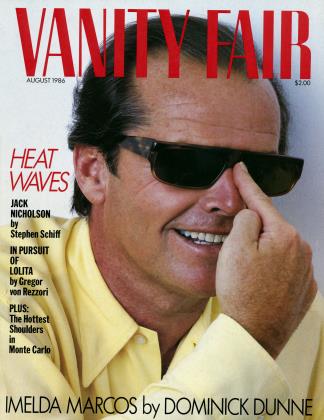Sign In to Your Account
Subscribers have complete access to the archive.
Sign In Not a Subscriber?Join NowEDITOR'S LETTER
AUGUST PERSONAGES
Just when you thought it was safe to go back into the water, along comes August Vanity Fair. This beach-reading issue is so hot it should come with a tub of Haagen-Dazs.
A year ago we singed your eyebrows with Dominick Dunne's Claus von Biilow story (with the additional cabaret of Helmut Newton's photographs of the old phony in black leather). This year Dunne has capped himself by turning in an extraordinary heart-to-heart with none other than Imelda Marcos in exile (see page 52). Acting on the introduction of one of V.F.'s social honchos, Dunne turned up in Hawaii and slipped into a five-hour rally of Imelda's supporters. As it turned out, it was his willingness to stay to the bitter end of the rally that finally persuaded the former First Lady to let him inside her three-bedroom rental, now bursting at the seams with snoring guards and listless domestics. He expected a formal ten-minute audience, but she let him stay for three and a half hours, unburdening herself in an emotional oratorio that could have been set to music by Andrew Lloyd Webber.
This is the latest in a long line of Dunne scoops for V.F. He is one of those writers who seem effortlessly to collide with copy that other journalists romanticize about in pressclub bars. Movie stars confide to his answering machine. Wanted men hail the same taxi. Heiresses unload their life stories in elevators. Except, of course, Dunne's luck is not luck. People love to talk to him because he has a gift for intimacy that is real and generous. It goes with a large capacity for human sympathy drawn from a life that has had its own extremes of limelight and tragedy. While he never loses his extraordinary news sense, he is not afraid to be moved. This is what makes him a quintessential Vanity Fair writer.
Originality of thought is the stamp of Gregor von Rezzori's work. But when I was reading his latest novel, The Death of My Brother Abel, something else struck me. His style and "voice" have an affinity with Vladimir Nabokov's. It seems that the famously finicky Nabokov must have shared this view, because he later approved the Austrian emigre's work when he translated Lolita into German in 1958. An idea dawned. Why not ask Mr. von Rezzori to recreate Humbert Humbert's drive across America? "Grisha" was instantly intrigued (page 78), and he went off to aim his European sensibility at the freeways.
One surprise was how little space Humbert's journey occupied in Nabokov's masterpiece. That drive with the legendary nymphet is the central memory of the novel. In fact, as von Rezzori points out, the erotic odyssey around motel America is only a few more than a dozen of the three hundred pages.
As he braced himself for the Big Mac trail, V.F.'s intrepid literary historian found himself face-to-face with the complexities of his own affair with the United States. "Between the publication of our German translation of Lolita," he writes, "and the day I slipped into the role of Quilty and set out in pursuit of the ever eloping couple, another quarter of a century had passed. .. .In [that time] my world and I had undergone a pretty thorough, if secondhand, Americanization. It was as if Humbert had been married to Lolita for a quarter of a century and then decided to have a look at where she came from."
Just as Nabokov pursues his butterflies, von Rezzori pursues his fantasy of Lolitaland—until he finds it in the most unexpected place. It's a compelling and evocative read.
As is Stephen Schiff's intelligent piece on Jack Nicholson (page 60), who's exuding his mean magic on our cover this month. Nicholson talked to Schiff about the creation of his role not playing Carl Bernstein in the delicious Mike Nichols movie of Heartburn, Nora Ephron's roman a clef about adultery. Shortly after the preview of Heartburn, Carl Bernstein, Nora Ephron's ex-husband, asked me apprehensively if I felt that the character who definitely wasn't him looked as if he went on to be a neglectful father. I was able to reassure him. Nicholson's performance is fiendishly charming and intelligently sexy. Anyway, what's he got to worry about—no other byline has been played by Jack Nicholson and Dustin Hoffman before hitting the male menopause.
Imelda, Humbert, Jack—that's enough for anyone's beach bag. Vanity Fair is now the fastest-growing consumer magazine in America: number one out of 403, according to the latest audited circulation figures. Hooray! Soon we'll be able to say: Thanks, half a million.
Editor in chief
 View Full Issue
View Full Issue












Subscribers have complete access to the archive.
Sign In Not a Subscriber?Join Now